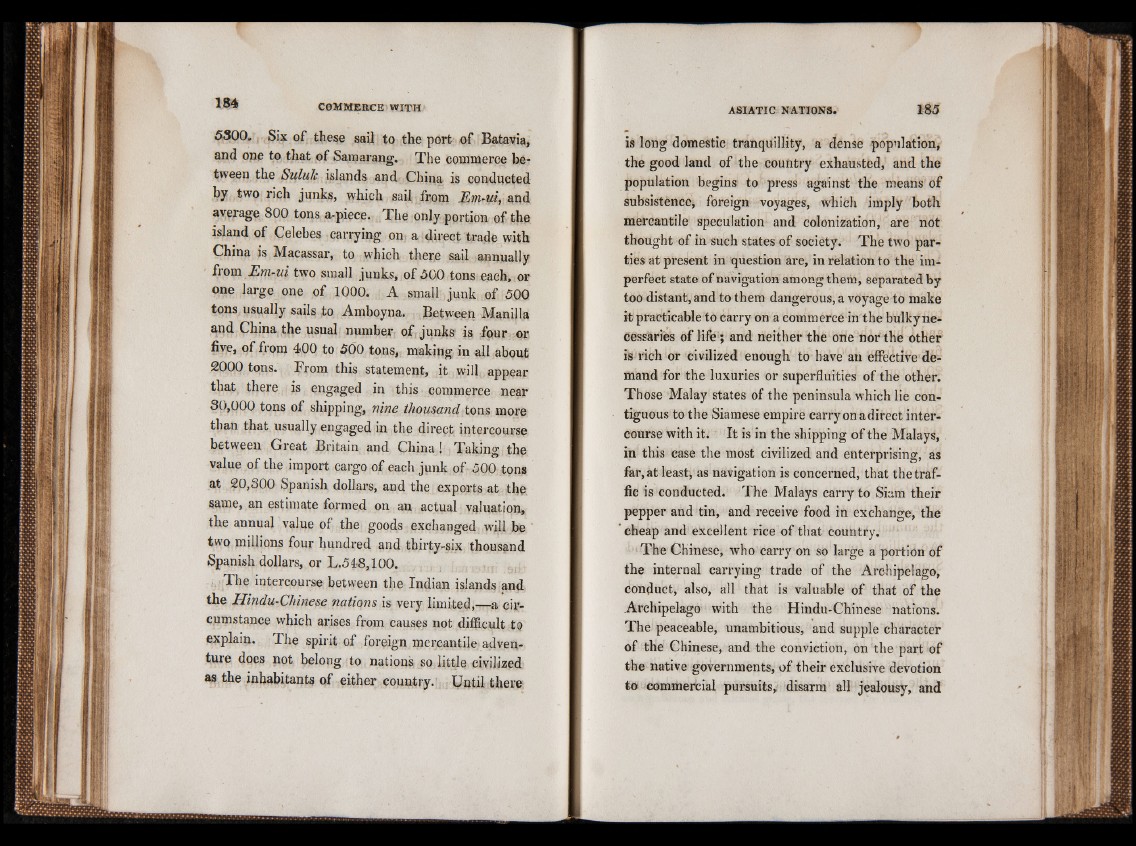
5300. Six of these sail to the port of Batavia,
and one to that of Saraarang. The commerce between
the Sululc islands and China is conducted
by two rich junks, which sail from Em-ui, and
average 800 tons a-piece. The only portion of the
island of Celebes carrying on a direct trade with
China is Macassar, to which there sail annually
from Em-ui two small junks, of 500 tons each, or
one large one of 1000. A small junk of 500
tons usually sails to Amboyna. Between Manilla
and China the usual number of junks is four or
five, of from 400 to 500 tons, making in all about
2000 tons. From this statement, it will, appear
that there is engaged in this commerce near
30,000 tons of shipping, nine thousand tons more
than that usually engaged in the direct intercourse
between Great Britain and China! Taking the
value of the import cargo of each junk of 500 tons
at 20,300 Spanish dollars, and the exports at the
same, an estimate formed on an actual valuation,
the annual value of the goods exchanged will be
two millions four hundred and thirty-six thousand
Spanish dollars, or L.548,100.
The intercourse between the Indian islands and
the Hindu-Chinese nations is very limited,—a circumstance
which arises from causes not difficult to
explain. The spirit of foreign mercantile^ adventure
does not belong to nations so little civilized
as the inhabitants of either country. Until there
is long domestic tranquillity, a dense population,
the good land of the country exhausted, and the
population begins to press against the means of
subsistence, foreign voyages, which imply both
mercantile speculation and colonization, are not
thought of in Such states of society. The two parties
at present in question are, in relation to the imperfect
state of navigation among them, separated by
too distant, and to them dangerous, a voyage to make
it practicable to earry on a Commerce in the bulky necessaries
of life1; and neither the one nor the other
is rich or civilized enough to have an effective demand
for the luxuries or superfluities of the other.
Those Malay states of the peninsula which lie contiguous
to the Siamese empire carry on adirect intercourse
with it. It is in the shipping of the Malays,
in this case the most civilized and enterprising, as
far, at least, as navigation is concerned, that the traffic
is conducted. The Malays carry to Siam their
pepper and tin, and receive food in exchange, the
' cheap and excellent rice of that country.
The Chinese, who carry on so large a portion of
the internal carrying trade of the Archipelago,
conduct, also, all that is valuable of that of the
Archipelago with the Hindu-Chinese nations.
The peaceable, unambitious, and supple character
of the Chinese, and the conviction, on the part of
the native governments, of their exclusive devotion
to commercial pursuits* disarm all jealousy, and